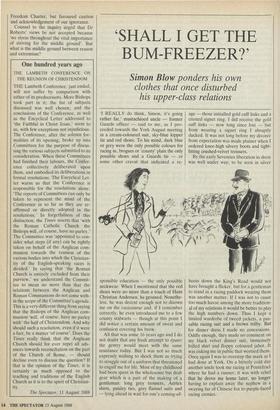One hundred years ago
THE LAMBETH CONFERENCE ON THE REUNION OF CHRISTENDOM
THE Lambeth Conference, just ended, will not suffer by comparison with either of its predecessors. More Bishops took part in it; the list of subjects discussed was well chosen; and the conclusions of the Conference, as well as the Encyclical Letter addressed to 'the Faithful in Christ Jesus,' seem to us, with few exceptions not injudicious. The Conference, after the solemn for- malities of its opening, broke up into Committees for the purpose of discus- sing the various subjects submitted to its consideration. When these Committees had finished their labours, the Confer- ence collectively deliberated upon them, and embodied its deliberations in formal resolutions. The Encyclical Let- ter warns us that the Conference is responsible for the resolutions alone. 'The reports of Committees can only be taken to represent the mind of the Conference in so far as they are re- affirmed or directly adopted in the resolutions.' In forgetfulness of this distinction, the Times asserts that 'with the Roman Catholic Church the Bishops will, of course, have no parley.' The Committee was 'appointed to con- sider what steps (if any) can be rightly taken on behalf of the Anglican com- munion towards the reunion of the various bodies into which the Christian- ity of the English-speaking races is divided.' In saying that 'the Roman Church is entirely excluded from their purview,' we understand the Commit- tee to mean no more than that the relations between the Anglican and Roman Communions do not come with- in the scope of the Committee's agenda. This is a very different thing from saying that the Bishops of the Anglican com- munion 'will, of course, have no parley with' the half of Christendom. And why should such a resolution, even if it were a fact, be a matter 'of course'. Does the Times really think that the Anglican Church should for ever repel all adv- ances towards reconciliation on the part of the Church of Rome, — should decline even to discuss the question? If that is the opinion of the Times, it is certainly as much opposed to the teaching and traditions of the English Church as it is to the spirit of Christian- ity. The Spectator, 11 August 1888






















































 Previous page
Previous page